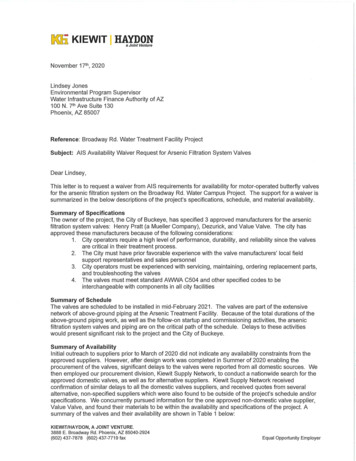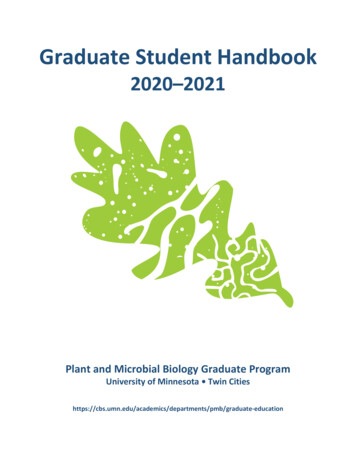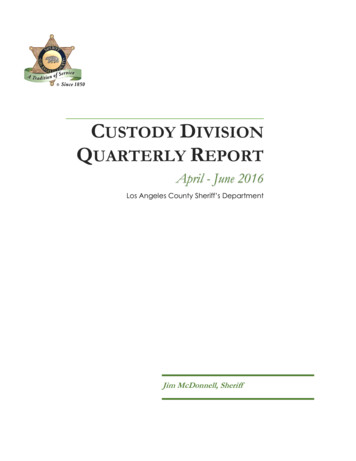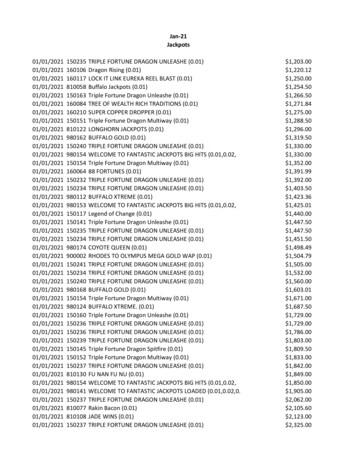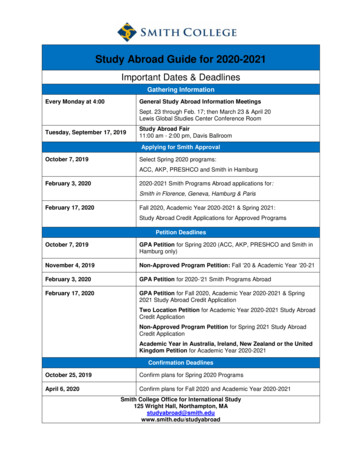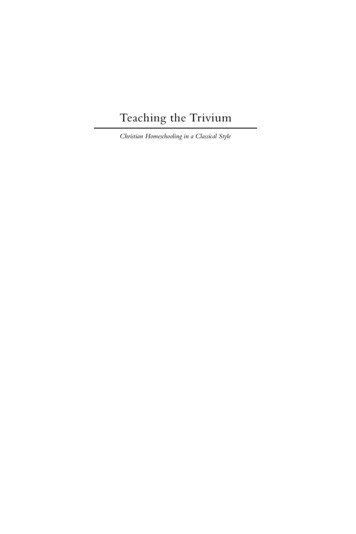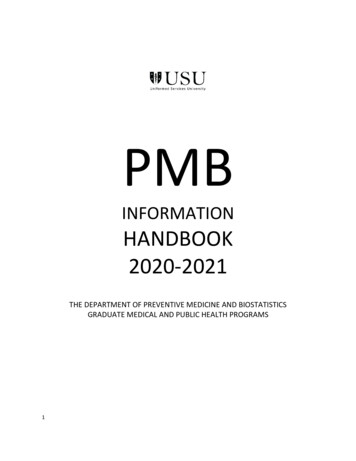
Transcription
PMBINFORMATIONHANDBOOK2020-2021THE DEPARTMENT OF PREVENTIVE MEDICINE AND BIOSTATISTICSGRADUATE MEDICAL AND PUBLIC HEALTH PROGRAMS1
Table of ContentsPMB GRADUATE PROGRAM 2020/2021 CALENDAR .5PROGRAM BACKGROUND AND MISSION .6MASTERS DEGREE PROGRAMS AND CURRICULUM .8Master of Public Health (MPH) Degree Program .8Program Description .8Summary of Program Learning Objectives .8Course Requirements .9Independent Project Guidelines .13MPH/MTM&H Practicum Experience Guidelines .16Admission Requirements .17Master of Tropical Medicine and Hygiene (MTM&H) Degree Program .19Program Description .19Course Requirements .19Admission Requirements .20Master of Health Administration and Policy (MHAP) Degree Program .21Program Description .21Course Requirements .21MHAP Program Competency Domains .22MHAP Program Residency .24Admission Requirements .25Master of Science in Public Health (MSPH) Degree Program in Environmental and Occupational Health .26Program Description .26Course Requirements .26Additional Requirements .28Admission Requirements .29Master of Science in Public Health (MSPH) Degree Program in Vector Biology and Parasitology .30Program Description .30Course Requirements .31Additional Requirements .32Admission Requirements .33Master of Science (MS) Degree Program in Vector Biology and Parasitology .33Program Description .33Course Requirements .34Additional Requirements .352
Vector Biology MS Curriculum Competencies .35Admission Requirements .36DOCTORAL DEGREE PROGRAMS AND CURRICULUM .37Doctor of Philosophy (PhD) Degree Program in Public Health .38Program Description .38Course Requirements .39Additional Requirements .41Admission Requirements .43Doctor of Philosophy (PhD) Degree Program in Environmental and Occupational Health .44Program Description .44Course Requirements .44Additional Requirements .46Admission Requirements .49Doctor of Philosophy (PhD) Degree Program in Vector Biology and Parasitology .50Program Description .50Course Requirements .51Additional Information .51Admission Requirements .52GRADUATE MEDICAL EDUCATION PROGRAMS .53Occupational and Environmental Medicine (OEM) Residency .53Public Health and General Preventive Medicine (GPM) Residency .57PROCEDURES AND POLICIES .62USU Academic Policies.62Responsible Conduct of Science .62Academic Honesty .62Academic Freedom .63Personal Interactions with Faculty .63Academic Standing Policy .64Sexual Harassment Policy and Procedure .65Inclement Weather Policy .67COURSE DESCRIPTIONS .70LIST OF COURSES .70OCCUPATIONAL AND ENVIRONMENTAL HEALTH SCIENCES (OEHS) .75EPIDEMIOLOGY AND BIOSTATISTICS (EPI/BIOST) .82HEALTH SERVICES ADMINISTRATION (HSA) .853
SOCIAL AND BEHAVIORAL SCIENCES (SOC/BEHAV) .92GLOBAL PUBLIC HEALTH (GPH) .92DEPARTMENTAL COURSES (DEPT) .103FACULTY .111GRADUATES .1174
PMB GRADUATE PROGRAM 2020/2021 CALENDARPre-Fall SessionMonday, 6 Jul 2020 – Orientation, Incoming PMB Graduate StudentsTuesday, 7 Jul 2020 – Pre-Fall Session Classes BeginFriday, 17 Jul 2020 – PMB Orientation for Fall QuarterMonday-Friday, 20 - 24 Jul 2020 – Registration for Fall Quarter ClassesThursday, 13 Aug 2020 – Pre-Fall Session Classes EndFriday, 14 Aug 2020 – End of Session RecessFall QuarterMonday, 17 Aug 2020 – Fall Quarter Classes BeginFriday, 28 Aug 2020 – Last Day to Drop/Add Fall CoursesMonday, 7 Sep 2020 – Labor Day (Holiday)Monday – Friday, 5-9 Oct 2020 – Registration for Winter Quarter ClassesMonday, 12 Oct 2020 – Columbus Day (Holiday)Friday, 6 Nov 2020 – Fall Quarter Classes EndMonday – Tuesday, 9-10 Nov 2020 – End of Quarter RecessWinter QuarterWednesday, 11 Nov 2020 – Veterans Day (Holiday)Thursday, 12 Nov 2020 - Winter Quarter Classes BeginFriday, 20 Nov 2020 - Last Day to Drop/Add Winter CoursesThursday – Friday, 26-27 Nov 2020 - Thanksgiving RecessMonday, 21 Dec 2020 – Friday, 1 Jan 2021 - Winter RecessMonday, 18 Jan 2021 - Martin Luther King, Jr's Birthday (Holiday)Monday – Friday, 25-29 Jan 2021 - Registration for Spring Quarter ClassesThursday, 11 Feb 2021 - Winter Quarter EndsFriday, 12 Feb 2021 – End of Quarter RecessSpring QuarterMonday, 15 Feb 2021 – President’s Day (Holiday)Tuesday, 16 Feb 2021 – Spring Quarter Classes BeginFriday, 26 Feb 2021 – Last Day to Drop/Add Spring CoursesMonday – Friday, 22-26 Mar 2021 – Spring RecessMonday – Friday, 19-23 Apr 2021 – Registration for Summer Quarter ClassesWednesday, 12 May 2021 – Spring Quarter EndsThursday – Friday, 13-14 May 2021 – End of Quarter RecessPMB Summer SessionMonday, 17 May 2021 - Summer Session BeginsMonday, 31 May 2021 - Memorial Day (Holiday)Friday, 28 May 2021 - Last Day to Drop/Add Summer CoursesMonday – Tuesday, 7-8 Jun 2021 - Oral Presentations (MPH degree candidates)Thursday, 17 Jun 2021 - Summer Session EndsThursday, 17 Jun 2021 – PMB Graduation Ceremony5
PROGRAM BACKGROUND AND MISSIONThe Uniformed Services University (USU) (http://www.usuhs.edu) was established by Congressin 1972 and was authorized to develop advanced degree programs in the various healthsciences with a priority on preparing qualified individuals for careers as Medical Officers in theUniformed Services. As the Nation’s only federal institution for higher learning in the healthsciences, it is committed to excellence in military medicine and public health during peacetimeand during war, fulfilling a unique mission among Schools of Medicine within the United States.The University’s F. Edward Hébert School of Medicine and the Graduate School of Nursing havebeen and continue to be essential resources for the Surgeons General of the Army, Navy, AirForce, and the U.S. Public Health Service. The University benefits from a wealth of knowledgeand leadership within their faculty members who serve as educators, researchers, andconsultants for military medical readiness, disaster relief, emergency preparedness, and forcehealth protection issues. Located next to the Walter Reed National Military Medical Center(WRNMMC) on the Naval Support Activity, Bethesda, Maryland, USU also collaborates with theneighboring National Institutes of Health, the Armed Forces Radiobiology Research Institute(AFRRI), and the National Library of MedicineThe mission of the PMB Graduate Programs in Public Health is to enhance and protect thehealth of members of the Uniformed Services by producing knowledgeable and highly skilledpublic health professionals and by promoting evidence-based policy making, research, andservice initiatives that support the global mission of the Uniformed Services.To achieve the PMB Graduate Programs’ mission, the following primary goals have beenidentified for the three major functional areas (instruction, research, and service):In the area of instruction, our goal is to provide a high quality graduate level curriculum inpublic health for uniformed and civilian students to acquire the requisite knowledge and skillsfor public health careers that meet the needs of the Uniformed Services’ community.In the area of research, our goal is to improve the knowledge base and practice of preventivemedicine and public health by conducting research and other scholarly activities with publichealth relevance, especially to the Uniformed Services’ community in support of combat andstability operations or disaster relief/humanitarian assistance missions.In the area of service, our goal is to support our University’s mission, as well as to respond tothe needs of local, national, and international communities through consultative services,clinical practice, continuing education programs, training opportunities, volunteerism, andcommunity partnerships to improve public health.6
ACCREDITATIONThe Graduate Programs at USU are fully accredited by the Commission on Higher Education ofthe Middle States Association of Colleges and Schools. In addition, the Public Health GraduatePrograms in the Department of Preventive Medicine and Biostatistics are accredited by theCouncil on Education for Public Health (CEPH) the national accrediting organization forPrograms and Schools of Public Health. In 2013, our MPH program received full accreditationfor the maximum seven-year term through 2020. In addition, the Master of Science in PublicHealth (MSPH) program in the area of Industrial Hygiene is certified under the AccreditationBoard for Engineering and Technology (ABET). The Master of Health Administration and Policy(MHAP) program is currently accredited by the Commission on Accreditation of HealthcareManagement Education (CAHME).7
MASTERS DEGREE PROGRAMS AND CURRICULUMMaster of Public Health (MPH) Degree ProgramProgram DescriptionThe MPH degree program provides a broad didactic experience in public health and preventivemedicine. It is a rigorous curriculum with a quantitative focus, is sequenced to be completedwithin 12 months, and is primarily designed for individuals planning to practice preventivemedicine, occupational medicine or public health within, or in conjunction with the uniformedservices. An MPH degree or its academic equivalent is a specific requirement for physiciansseeking board certification in Aerospace Medicine, General Preventive Medicine and PublicHealth, Occupational and Environmental Medicine, and several other public health specialties.Matriculants may include physicians and other academically qualified health professionals, suchas veterinarians, dentists, sanitary engineers, microbiologists, entomologists, environmentalscientists, nurses, and pharmacists, who wish to apply the core disciplines of public health totheir career field. Uniformed personnel with education or experience in a health-relateddiscipline are given priority as candidates for admission.Graduates are expected to use their acquired quantitative and analytical skills in biostatisticsand epidemiology to identify and measure community health needs and to investigate theimpact of biological, environmental, and/or behavioral factors to solve public health problems.Each graduate will understand the components, operations, and financing of healthcaredelivery services, particularly those in the public sector, and have the administrative skills toplan, analyze, manage, and improve public health programs for the uniformed services. Inaddition, many graduates will complete an “area of concentration” with required and electivecourse work in a specific area of public health and demonstrate the ability to apply appropriatespecialized knowledge and skills to their chosen field.The MPH degree program consists of a minimum of 60 quarter credit hours, to include 38quarter credit hours from core required courses within the Department of Preventive Medicineand Biostatistics. Core requirements include coursework in epidemiology, biostatistics,environmental health, health services administration, and social and behavioral sciences. Theminimum credit load per quarter required for a full-time student is 12, the maximum allowed is22, and the typical load is 16-18. The satisfactory completion of an independent project and apracticum experience is required, and the courses related to these requirements are part of thecore curriculum. The independent project is the capstone of the program and should representthe synthesis, integration, and application of core public health concepts and principles to solveor advance our understanding of a public health problem.Summary of Program Learning ObjectivesBiostatistics: Upon completion of the core courses in this discipline, students will be able tocollect, analyze, and interpret data of public health importance using appropriate descriptiveand inferential statistical techniques, including both bivariate and multivariate methods. In8
addition, students will become familiar with the use of a statistical program, such as Stata orSPSS.Environmental and Occupational Health: Upon completion of the core courses in thisdiscipline, students will be able to identify, measure, and analyze environmental andoccupational factors affecting health. Students will have the ability to (1) describe the factorsthat may impact health in the community, home, and workplace, (2) effectively communicaterisk, and (3) explain the standards and controls necessary to mitigate these factors.Epidemiology: Upon completion of the core courses in this discipline, students will be able to(1) discuss the basic concepts pertaining to the natural history of disease in populations, (2)identify and list the strengths and weaknesses of various sources of data, (3) define measures ofdisease in populations, and (4) critically assess the validity and relevance of descriptive andanalytical studies. Students will develop an understanding of the basic concepts ofepidemiology and be able to apply them to the analysis and interpretation of epidemiologicdata.Health Services Administration: Upon completion of the core courses in HSA, students willacquire the necessary skills to critically analyze the organization, structure, function, andeffectiveness of health care systems and be able to (1) describe and compare the variety ofhealth services in developed countries, (2) discuss, in depth, the current policy issues thatimpact the United States healthcare system, and (3) explain the behavioral and economicfoundations for health promotion and disease prevention strategies in the United States.Students completing the HSA concentration will be equipped to become leaders and managersable to create, develop, and continuously improve high quality health systems.Social and Behavioral Sciences: Upon completion of the core courses in this discipline,students will be able to (1) list and explain the behaviors and social factors associated withmorbidity and mortality, and (2) describe behavior-related theories and prevention strategiesfor modification and reduction of injuries and illnesses. Students will develop the ability toidentify and utilize the relationship of human behavior and social factors in public healthpractice.Course RequirementsMPH Core CurriculumMPH Core CurriculumMust take the followingPMO530 Social and Behavioral Science Applied to Public HealthPMO540 Introduction to Environmental and Occupational HealthPMO599 Introduction to Health Risk CommunicationPMO680 Introduction to Public re-Fall
O670PMO674Biostatistics IIntroduction to EpidemiologyHealth SystemsIntroduction to MPH Project and PracticumBiostatistics IIPrinciples of Health Care ManagementMPH Project/Practicum Design and DevelopmentMPH Project/Practicum Implementation and EvaluationMPH PracticumMPH Independent rSpringSummerSummerMPH ConcentrationsIn addition to completing the core courses listed above, MPH students will select an area ofconcentration from among the following: epidemiology, biostatistics, environmental andoccupational health, health services administration, global health, or general preventive publichealth. These areas of concentration are intended to help guide students who wish to focustheir training and coursework on a particular area of public health. The required courses foreach concentration are listed below. On occasion, and with permission from the MPH ProgramDirector, these required courses may be modified based on the student’s educational goals.Epidemiology and Biostatistics: Students completing this concentration will be able to functionas epidemiologists in the Uniformed Services. They will acquire an understanding of advancedconcepts in acute and chronic disease epidemiology, and have the ability to select and applyappropriate epidemiological and biostatistical methods in planning and carrying outepidemiological investigations.Epidemiology and Biostatistics ConcentrationMust take the following:PMO 1030Introduction to Data ManagementPMO512Epidemiologic MethodsPMO513Advanced Epidemiologic MethodsTake at least two of these courses:PMO508Biostatistics IIIPMO514Epidemiology and Control of InfectiousDiseasesPMO515Chronic Disease Epidemiology and ControlPMO519Occupational and llWinterSpring
PMO595PMO611PMO1028Introduction to Complex Sample SurveyAnalysisClassic Studies in EpidemiologyIntroduction to Machine Learning2Spring23FallSpringOccupational and Environmental Health Science: This concentration provides students with thefundamental concepts and principles of environmental and occupational health, toxicology,industrial hygiene, health physics, and a survey of occupational/environmental diseases.Occupational and Environmental Health Science ConcentrationMust take the following:Credits QuarterPMO541 Advanced Environmental Health3FallPMO549 Principles of Toxicology3FallPMO550 Industrial Hygiene and Laboratory4WinterPMO601 Environmental Health Risk Assessment 2WinterHealth Services Administration: Students completing this concentration will be able to apply thenecessary skills to design and develop, implement and evaluate, and continuously improveprograms and systems related to promotion and health education and health care delivery inthe Uniformed Services. Students will also understand and be able to apply concepts offinancial management, decision making, and quality assessment to health systems and be ableto develop broad policy statements concerning health care programs in the public sector as aHealth Services Officer in the Uniformed Services.Health Services Administration ConcentrationMust take the following:PMO533Decision Making in Health ServicesPMO523Fundamentals of U.S. Health PolicyPMO576OrPMO1007PMO529Credits Quarter2Fall3WinterHuman Resource Management in Health Care 3SpringAdvanced Seminar in Global Health Policy3Spring2Spring21FallSummer2Pre-FallHealth Care Financial ManagementOrPMO 103 Fundamentals of Health Care FinancePMO998Foundations of LeadershipOrPMO 1010 Diversity and LeadershipGlobal Health: The mission of the USU Global Health concentration is to prepare globallyminded military professionals who will be able to plan and execute health engagement in11
support of security cooperation, stability operations, complex humanitarian emergencies andmedical crises around the world, in wartime and peacetime. This area of concentrationincorporates the global health competencies of capacity strengthening, collaborating andpartnering, ethical reasoning and professional practice, health equity and social justice,program management, socio-cultural and political awareness, and strategic analysis asdescribed by the Associations of Schools and Programs of Public Health. The concentration alsoprovides a strategic and operational perspective of global and international health issues asapplicable to US national security. Health systems are examined from the internationalperspective looking at resources, access, policies, current challenges, potential solutions andopportunities for reform. The student will have a whole knowledge of US government globalhealth policy and engagement through both the lenses of civil society and the joint operator.Global Health ConcentrationMust take the following:PMO528 Global Health IPMO531 Program Planning and DevelopmentPMO539 Global Health IIPMO548 Joint Health Operations (Joint Health Operations I is 2credits offered in the Winter & Joint Health Operations II is3 credits offered in the Spring)PMO613 Public Health Issues of Disasters in Developing CountriesCredits4342&3Recommended general Global Health courses include:PMO1007 Advanced Seminar in Global Health PolicyPMO1009 Domestic Disaster Management and g33SpringWinterTropical Public Health: This concentration will enable students to function effectively worldwideas Preventive Medicine, Public Health, and Medical Officers in the Uniformed Services.Graduates will be able to apply the basic concepts and principles of tropical medicine, malariacontrol, and vector biology to the epidemiology, diagnosis, treatment, prevention, and controlof tropical diseases.Tropical Public Health ConcentrationMust take the following:PMO1030 Introduction to Data ManagementPMO512Epidemiologic MethodsPMO560Principles and Practices of Tropical MedicinePMO565Vector BiologyPMO569Malaria Epidemiology and ControlRecommended courses include:PMO548Joint Health OperationsPMO561Medical allSpring23WinterSpring
PMO564A Epidemiology and Control of ArbovirusesAdditional Required Courses for the MTM&HPMO561Medical ParasitologyPMO564A Epidemiology and Control of ArbovirusesPMO990Travel Medicine and Travel Clinic ProgramPMO992Travel Medicine and Travel Clinic ProgramPMO563Tropical Medicine PracticumPMO613Public Health Issues of Disasters in Developing CountriesPMO614Tropical Medicine RoundsPMO661Current Topics in Preventive Medicine and ummerAllSpringSpringSpringGeneral Preventive Public Health: Students completing this concentration will be able tofunction as preventive medicine specialists in the Uniformed Services. They will acquire anunderstanding of advanced concepts in acute and chronic disease epidemiology, have theability to select and apply appropriate epidemiological and biostatistical methods in planningan
quarter credit hours from core required courses within the Department of Preventive Medicine and Biostatistics. Core requirements include coursework in epidemiology, biostatistics, environmental health, health service


